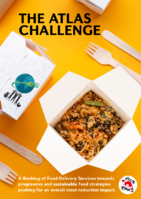
Food Delivery Services
How does your favorite food delivery service compare?
In today's world, when hunger strikes, it couldn't be easier to order a cheap burger made from low-quality meat and have it delivered to your doorstep through one of the many online platforms available in no time. However, it is important to be mindful that products from factory farming not only cause immense animal suffering, but also make a significant contribution to the climate crisis. At the same time, consumers are becoming increasingly aware of the need for a healthy diet that is also sustainable in terms of animal welfare and environmental protection. In this rapidly growing industry, it is now more important than ever that the food delivery services face their responsibility and make the most sustainable dish the easiest choice for consumers.
Food delivery services were the focus of the very first ranking in the Atlas Challenge series in 2020 (see 2020 report below). In 2024, FOUR PAWS takes another look at this sector to see where it currently stands regarding meat and dairy reduction and climate goals, animal welfare, and vegan food increase. FOUR PAWS ranked 18 subsidiaries of five global holding companies – Deliveroo, Delivery Hero, DoorDash, Just Eat Takeaway.com and Uber – with a presence in Austria, Switzerland, Germany, the Netherlands, the United Kingdom, the United States of America, and South Africa.
Did You Know?
- The global number of food delivery services app users increased by 140% from 2018 to 2023 alone and is expected to grow up to 2.5 billion users by 20281.
- The revenue of the global online meal delivery sector more than tripled from $112 billion dollars in 2017 to nearly $398 billion dollars in 20232 and is projected to reach a revenue of $444 billion dollars in 20243.
- Animal agriculture is a dominant driver of the climate crisis and the leading source of two of three of the most harmful greenhouse gases on earth: methane and nitrous oxide.
- It is estimated that 92.2 billion farmed land animals are used for food (meat, milk and eggs) every year globally4; of these, an estimated 83.3 billion are slaughtered for meat for human consumption5.
- Approximately three quarters of farmed land animals are living in factory farms6,7.
Source
2. Global online food delivery market size 2017-2028. Statista. [accessed 2025 May 14]. https://www.statista.com/statistics/1170631/online-food-delivery-market-size-worldwide/
3. Meal Delivery - Worldwide | Statista Market Forecast. Statista. [accessed 2025 May 14 ]. https://www.statista.com/outlook/emo/online-food-delivery/meal-delivery/worldwide
4. Food and Agriculture Organization of the United Nations. Crops and livestock products (Selection: World, Producing Animals/Slaughtered, Livestock Primary [minus Beeswax, Fats, Offal, Honey, Hides and Skins, Wool, Silk-worm cocoons, Snails], 2023). FAOSTAT. [accessed 2025 May 13]. https://www.fao.org/faostat/en/#data/QCL
5. Food and Agriculture Organization of the United Nations. Crops and livestock products (Selection: World, Producing Animals/Slaughtered, Livestock Primary [all types of meat], 2023). FAOSTAT. [accessed 2025 May 13]. https://www.fao.org/faostat/en/#data/QCL
6. Ritchie H. How many animals are factory-farmed? Our World in Data. 2023 Sep 25 [accessed 2025 May 14]. https://ourworldindata.org/how-many-animals-are-factory-farmed
7. Anthis K, Anthis JR. Global Farmed & Factory Farmed Animals Estimates. 2019 Feb 19 [accessed 2025 May 14]. (Estimates). https://sentienceinstitute.org/global-animal-farming-estimates

















